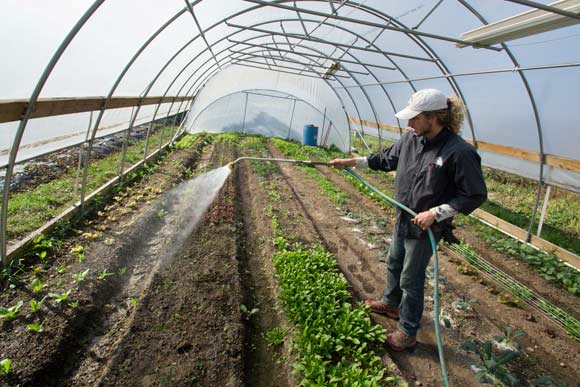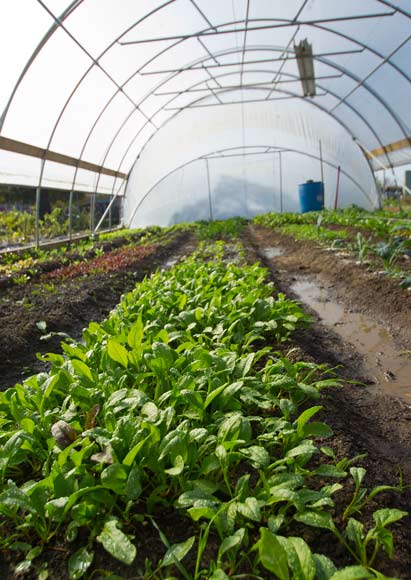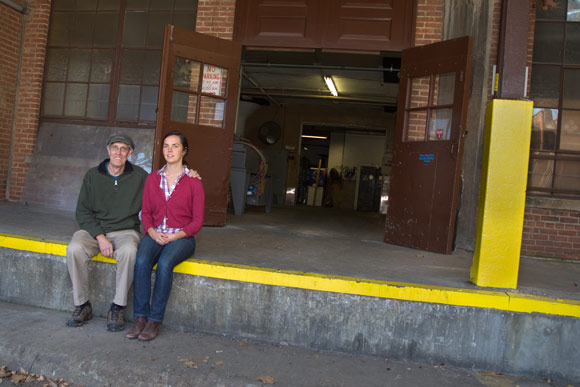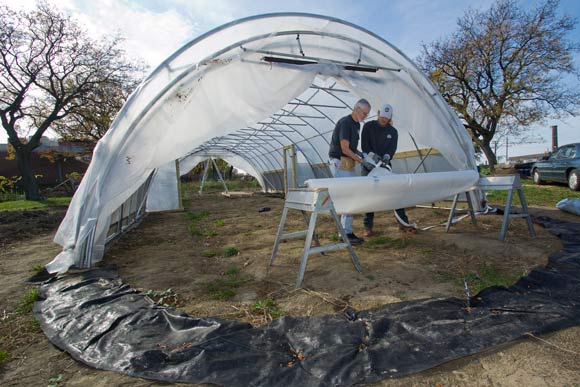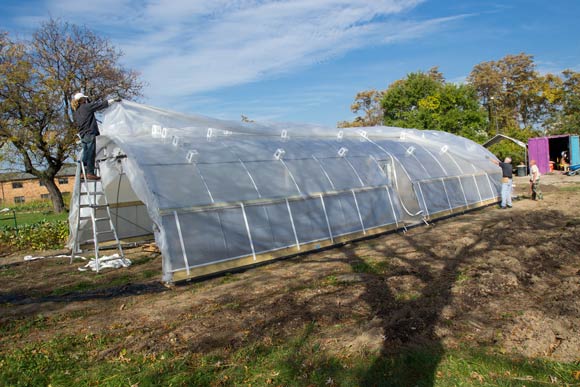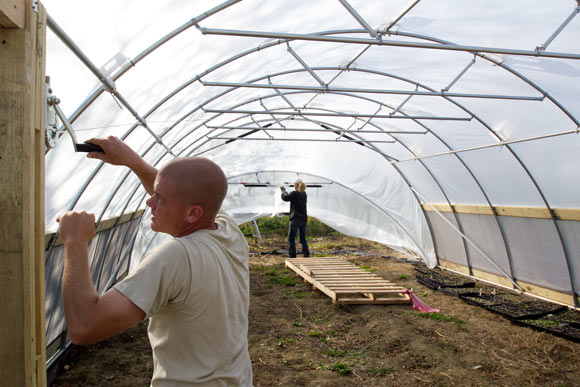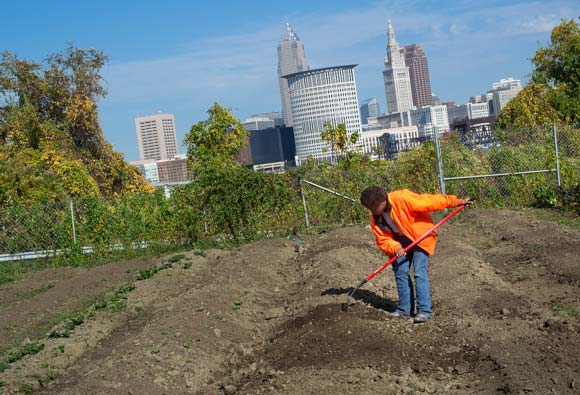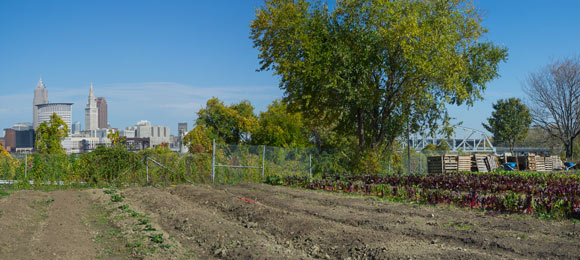as local urban farm movement matures, so too do strategies for year-round success
On a pair of empty city lots that once grew pop bottles, weeds and trash, Elle Adams of City Rising Farm in Hough recently broke ground on an 8,000-square-foot market garden that will be used to teach teenagers how to grow their own food.
“The neighborhood is a food desert -- there’s no grocery store within a mile of here,” says Adams, who launched her farm as an alternative to the corner stores that sell only canned goods. “At first, people didn’t know what cherry tomatoes were. They’d say, ‘What is that?’ There’s a whole generation that grew up without a grocery store.”
Before the first snowfall, Adams plans to install a hoop house that will allow her to grow produce even in the darkest days of January. It will be heated using only sunlight and slow-burning compost piles. “If Milwaukee can grow all year round, then we can too.”
Adams isn’t the only local food entrepreneur who has recently launched a new venture. From east to west, urban farmers and food producers are seizing on new opportunities.
In a former sausage factory off Clark Avenue, Molly Murray of Erie’s Edge Farm is building out a production facility for Wake Robin Fermented Foods. The 28-year-old boomerang will begin selling batches of pickles, sauerkraut and kimchi next year.
“There’s been a resurgence of traditional cultures and craft foods,” Murray says of the local-food startup scene. “Cleveland has so much space and so many interested people and foodies. The potential for making money on value-added foods here is big -- it’s enticing and exciting.”
On the site of the old Stanard School -- a building that literally was raining bricks until it was torn down four years ago to create a pioneering urban farm -- the nonprofit Cleveland Crops is launching a commercial kitchen that organizers will use to craft value-added products like salsa.
“We’ve grown tremendously in our ability to produce food -- and now our outlets have to grow too,” says Chris Yurick, Economic Development Manager with Cleveland Crops, who says creating new products will allow the organization to reach new customers.
Sowing the seeds of success
In recent years, Cleveland’s growing urban farming scene has gained national recognition as a creative response to the problems of foreclosure and vacancy. Now, as the City of Cleveland's "Year of Local Foods" comes to a close, homegrown entrepreneurs who have pioneered local food businesses over the past decade are developing new business strategies and tapping into fresh markets to help turn their startups into year-round businesses.
“Cleveland’s urban farmers are growing in terms of number, production ability and sophistication,” says Lilah Zautner, Sustainability Manager for Neighborhood Progress Inc. (NPI), a nonprofit intermediary that has led vacant land reuse efforts.
To help local food businesses expand, nonprofit partners are creating new programs to address their needs. Given that small-scale farming and artisan food production are difficult businesses under the best of circumstances, these efforts are essential.
The Economic Community Development Institute (ECDI), a nonprofit microlender based in Columbus, came to Cleveland after a study by the Cleveland Foundation revealed that a bevy of small businesses in Cleveland didn’t have access to traditional credit. Cleveland was one of the largest U.S. cities without a microlender, the study said.
Now, a few months after opening its office here, ECDI wants to replicate the “Food Fort” lending program that it started in Columbus. “Microlending in itself lends itself to food-based businesses,” says Eric Diamond, Vice President of ECDI’s Cleveland Market.
ECDI recently received a $788,000 grant from the U.S. Department of Health and Human Services to lend to small businesses in the neighborhoods around University Circle. The organization has a low default rate of 6.4 percent, in part because ECDI offers a lot of technical assistance to help businesses stay on the right track, Diamond says.
“We’d love to help growers of healthy foods,” says Diamond, adding that ECDI loans usually range from $500 to $100,000 and go towards equipment or operating capital.
In November, ECDI will move to newly renovated offices at 2800 Euclid Avenue being developed by Gordon Priemer. The building has a first floor commercial kitchen, and ECDI is working with Priemer to open it up for hourly rentals by food entrepreneurs.
Increase the value
While having access to capital is important, the right product is even more essential. The key to making urban farms sustainable and profitable, these entrepreneurs maintain, is creating products that last longer and fetch higher prices.
Molly Murray of Erie’s Edge Farm runs a successful Community-Supported Agriculture (CSA) program and also sells produce at the weekly Tremont Farmers Market. Murray came up with the idea behind Wake Robin Fermented Foods last year and recently signed a lease on space at the 100-year-old Hildebrandt Building on Cleveland's near-west side.
“Fermenting is a traditional method of storing vegetables when refrigeration is not an option,” Murray explains. The process involves cutting up vegetables, adding spices and salt and sealing them. “From chutney to pickles, this exists in most world cultures. Pickled things are meant to preserve nutrition when things are not growing.”
The product, which she will make year round in a cool, basement space, is in demand as a health food. “You can buy it at grocery stores in the suburbs, but there’s nothing like this that’s made here,” she says of her Korean-inspired kimchi, which can include carrots, beets and jalapenos. “Cabbage, salt and water is suddenly amplified when it’s in a jar.”
Adams also is planning to create high-value products that will allow her to expand. In some cases, this may simply involve growing crops that sell for more money, such as leafy greens and mushrooms sought after by local chefs.
Cleveland Crops plans to introduce value-added products like kale chips once its new kitchen opens in January. Since the organization’s mission is to hire people with disabilities, the best part is being able to employ his workers year-round, says Yurick.
Cleveland Crops, which is a collaborative project between the nonprofit group SAW Inc. and the Cuyahoga Board of Developmental Disabilities, already is the largest urban farmer in Cuyahoga County, with six sites totaling 11 acres across the region.
As the organization grows, Yurick anticipates reaching out to new customers, as well. “We need to develop a more diverse customer base, including farmers markets that might be more lucrative, as well as institutional buyers that can take larger volumes.”
Room to grow
One of the challenges that Cleveland’s urban farmers face is not having easy access to commercial kitchen space and other food-prep space that will allow them to grow.
Murray partnered with her father, Pat Murray, to build out Wake Robin’s space in the Hildebrandt building. Yet the construction work involved a fairly steep learning curve.
“There are a lot of technical issues with processing foods, and access to this information in Cleveland can be problematic,” says Pat Murray. Earlier this year, Molly Murray took a class at Ohio State University in acid-prepared foods. Both father and daughter have spent time navigating a maze of regulations with the Ohio Department of Agriculture.
Other entrepreneurs simply don’t have ready access to any commercial food prep space. Adams has been operating out of borrowed spaces in her neighborhood for years. “When people ask where my office is, I tell them the Hough library,” she jokes.
Nonetheless, Adams soon will be able to use the new commercial kitchen at the Thurgood Marshall Recreation Center, where she’ll teach canning and nutrition.
“We’re teaching people how to grow and what to do with all that produce,” Adams says. She hopes to bring back traditional, end-of-season recipes like tomato pie that are not only a way to use up all those extra tomatoes but also “oh my goodness, so delicious.”
Extend the season
Not many businesses can be profitable if they operated only seven months out of the year -- and small urban farms are no exception. Season extension technologies -- hoop houses, for example -- can be game changers that help level the playing field.
Local startup Tunnel Vision Hoops was created to address the growing need for well-designed hoop houses. Launched by Todd Alexander, Michael Walton and Carlton Jackson after the three farmers grew frustrated with available products, Tunnel Vision now is a thriving, growing company.
These days, Tunnel Vision is selling their hoop houses across Northeast Ohio -- and nationally. “We’re so busy now that we’ve brought on help,” Alexander says.
What makes these hoop houses different is that they are geared to small farmers. They are easier to set up than competitors’ products and function better in urban areas.
Season extension is the key to making urban farms profitable, Alexander says. “You’re getting a jump on the season. You can sell tomatoes before anyone else at the market. People will come to your stand first, and when they do, they’ll buy other things as well.”
Ultimately, Alexander says, it’s challenging to turn any startup business into a full-time, sustainable job. Yet despite the fact that running a farm can be all consuming, it’s well worth it and there are ways to make money and have a less stressful lifestyle, he says.
“If you’re doing a good job starting any business, you shouldn’t be getting enough sleep,” says Alexander, who also manages Central Roots Farm in Cleveland. “Optimism is the key -- you have to believe that you have the ability to make a living doing it.”
Photos Bob Perkoski


